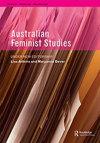Wild Disciplines and Multispecies Erotics: On the Power of Wanting Like a Hedgehog Champion
IF 1.5
4区 社会学
Q2 WOMENS STUDIES
引用次数: 1
Abstract
ABSTRACT While the erotic can be a vital source of change and sustenance for environmental action, how do we ensure we want well? Particularly, how do we do so when our care is directed towards a member of another species? Radically in decline in the UK, hedgehogs are increasingly attended to by thousands of largely urban-based volunteer conservationists nationwide. While these ‘hedgehog champions’ are typically captivated by the charms of hedgehogs, they also emphasise the importance of hedgehogs remaining ‘wild’, a quality they define as the need for hedgehogs to come and go freely from urban gardens. In this article, I focus on the use of this quiet, backyard ‘wildness’ to redirect potentially possessive modes of interspecies want. Through practicing disciplines of non-capture, hedgehog champions often come to delight in and care for the wider environments that support hedgehog lives. Through attending to hedgehogs in these expansive wild ways, however, it becomes clear that learning to love hedgehogs responsively in isolation is insufficient to make the changes hedgehogs need. Urban hedgehog conservation requires renewed attention to the power of the erotic as it plays out – and is fenced off – between humans.野生学科和多物种情色:想要像刺猬冠军的力量
摘要虽然情色可以成为改变和维持环境行动的重要来源,但我们如何确保我们想要的是好的呢?特别是,当我们的护理针对另一个物种的成员时,我们如何做到这一点?在英国,刺猬数量急剧下降,全国各地成千上万的志愿环保主义者越来越多地关注刺猬。虽然这些“刺猬冠军”通常被刺猬的魅力所吸引,但他们也强调了刺猬保持“野生”的重要性,他们将这种品质定义为刺猬需要在城市花园中自由出入。在这篇文章中,我重点讨论了利用这种安静的后院“野性”来重定向种间欲望的潜在占有模式。通过练习不捕捉的纪律,刺猬冠军经常会喜欢并关心支持刺猬生活的更广阔的环境。然而,通过以这些广阔的野生方式照顾刺猬,很明显,学会孤立地爱刺猬是不足以做出刺猬需要的改变的。城市刺猬的保护需要重新关注色情的力量,因为它在人类之间上演——并且被隔离开来。
本文章由计算机程序翻译,如有差异,请以英文原文为准。
求助全文
约1分钟内获得全文
求助全文
来源期刊

Australian Feminist Studies
WOMENS STUDIES-
CiteScore
2.50
自引率
0.00%
发文量
7
期刊介绍:
Australian Feminist Studies was launched in the summer of 1985 by the Research Centre for Women"s Studies at the University of Adelaide. During the subsequent two decades it has become a leading journal of feminist studies. As an international, peer-reviewed journal, Australian Feminist Studies is proud to sustain a clear political commitment to feminist teaching, research and scholarship. The journal publishes articles of the highest calibre from all around the world, that contribute to current developments and issues across a spectrum of feminisms.
 求助内容:
求助内容: 应助结果提醒方式:
应助结果提醒方式:


